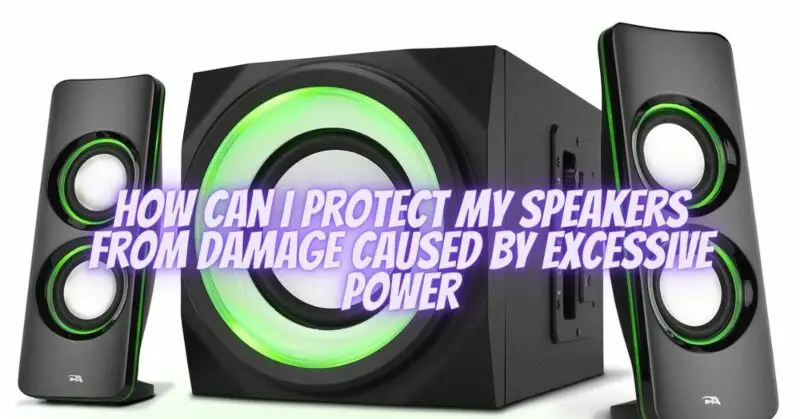Speakers are essential components of any audio system, and protecting them from damage is crucial for maintaining their performance and longevity. Excessive power can pose a significant risk to speakers, potentially leading to blown drivers, distortion, or even permanent damage. In this article, we will discuss effective measures to protect your speakers from damage caused by excessive power, ensuring optimal audio quality and speaker durability.
- Understand Speaker Power Ratings:
Familiarize yourself with the power ratings of your speakers to ensure they are compatible with your amplifier or receiver:
a. RMS (Root Mean Square) power rating: This indicates the continuous power handling capability of the speakers. Ensure that the amplifier’s power output does not exceed the RMS power rating of the speakers.
b. Peak power rating: This represents the maximum power level the speakers can handle momentarily. While occasional peaks above the RMS power are usually fine, sustained high levels can damage the speakers.
- Use Proper Amplifier/Receiver Power:
Match your speakers with an amplifier or receiver that provides appropriate power output:
a. Wattage compatibility: Choose an amplifier or receiver that delivers power within the range recommended by the speaker manufacturer. Excessive power can cause the speakers to overheat and potentially damage the voice coils or drivers.
b. Avoid underpowering: While overpowering speakers is a concern, underpowering them can also lead to distortion and damage. Insufficient power can cause the amplifier to clip, generating square waveforms that can harm the speakers. Aim for a balanced power match between the amplifier and the speakers.
- Utilize a Limiter or Compression Device:
Employing a limiter or compression device can protect your speakers from sudden bursts of excessive power:
a. Limiters: Limiters are devices that help control and limit the maximum output level from the amplifier. They prevent the amplifier from producing excessively high power that could damage the speakers. Consider using a limiter between the amplifier and the speakers, especially in situations where there is a risk of high-volume spikes or audio transients.
b. Compression devices: Compression devices, such as dynamic range compressors, can help smooth out audio peaks and prevent sudden power surges. They reduce the dynamic range and ensure a more controlled and consistent audio signal, protecting the speakers from damage.
- Proper Gain Staging and Volume Control:
Implementing proper gain staging and volume control practices can help prevent excessive power from reaching the speakers:
a. Gain matching: Adjust the gain or volume levels of your audio source, amplifier, and other components to achieve an appropriate balance. Avoid excessively high levels that could drive the amplifier into distortion or produce excessive power to the speakers.
b. Volume control: Exercise caution when adjusting the volume control. Gradually increase the volume while monitoring the sound quality, ensuring it remains distortion-free. Avoid sudden volume spikes, which can transmit excessive power to the speakers and risk damage.
- Regular Speaker Maintenance:
Perform regular maintenance to keep your speakers in optimal condition:
a. Inspect for damage: Regularly inspect your speakers for any signs of physical damage, such as torn cones or damaged voice coils. Address any issues promptly to prevent further damage.
b. Cleanliness: Keep your speakers clean by gently removing dust and debris from the drivers, grilles, and cabinets. Dust accumulation can impact performance and potentially cause overheating.
Conclusion:
Protecting your speakers from damage caused by excessive power is essential for ensuring optimal audio quality and extending their lifespan. Familiarize yourself with the power ratings of your speakers and choose an amplifier or receiver that matches their requirements. Consider using limiters or compression devices to control power levels, implement proper gain staging and volume control, and perform regular maintenance to keep your speakers in good condition. By following these guidelines, you can enjoy your audio system without the worry of damaging your valuable speakers and achieve the best possible sound reproduction for years to come.

